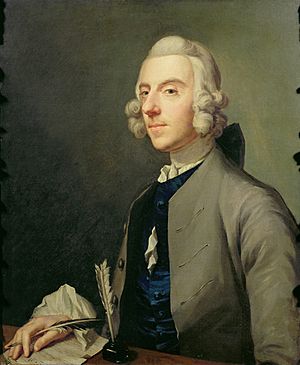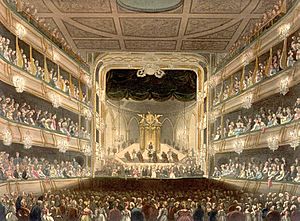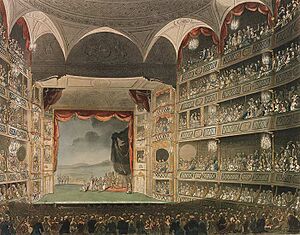Michael Arne facts for kids

Michael Arne (born around 1740 – died January 14, 1786) was an English composer, harpsichordist, organist, singer, and actor. He was the son of the famous composer Thomas Arne and the talented singer Cecilia Young. His mother was part of the well-known Young family of musicians. Like his father, Michael Arne mainly wrote music for the stage and songs for singers. He didn't write much music in other styles. He created many songs for London's fun pleasure gardens, and his most famous song is Lass with the Delicate Air (1762). Michael Arne wrote nine operas and helped with at least 15 others. His most successful opera, Cymon (1767), was performed many times during his life and even into the early 1800s.
Contents
Biography
Early Life and Music Career
Michael Arne was probably born in 1740 in the Covent Garden area of London. A music historian named Charles Burney, who was a friend of the Arne family, said Michael was Thomas Arne's son. However, some modern experts wonder if he might have been adopted.
His father, Thomas Arne, was a very important English theater composer in the 1700s. He helped bring English opera back to life in the 1730s. Michael's mother, Cecilia Young, was one of the best English sopranos (high-pitched female singers) of her time. She came from a famous family of musicians. Both Michael's grandfather, Charles Young, and his great-uncle, Anthony Young, were well-known organists and composers. His Aunt Isabella was also a successful soprano.
After 1745, Michael mostly lived with his aunt, the famous actress Susannah Maria Cibber. This was because his mother was often sick and his father was very busy. It's likely his aunt taught him his first music lessons. She also helped him make his first stage appearance as a Page in a play called The Orphan in the late 1740s.
Michael started his music career as a singer on February 20, 1750. He sang several times at the Vauxhall Gardens in the summer of 1750, where his father was the main composer. But Michael didn't sing or act for very long. Charles Burney wrote that Michael's father "tried to make him a singer, but he was naturally idle and not very quick." Michael preferred playing instruments. After the summer of 1750, he focused on composing music and playing the organ and harpsichord.
On February 5, 1751, he gave his first solo organ concert. He often played his father's organ music for the next thirty years. Michael also showed early talent as a composer. His first collection of songs, The Floweret, was published in 1750. This collection included a popular Scottish-style song called "The Highland Laddie."
Middle Years and Career
During the 1750s and 1760s, Arne worked as an organist, harpsichordist, and composer for London's theaters and pleasure gardens. He got married in the 1750s, but his wife passed away a few years later.
From 1756, he wrote a lot of music for plays, much like his father did. He created several successful operas and published many song collections. Many of his songs were written for performances in London's fun pleasure gardens. One of his most famous songs is Lass with the Delicate Air, which first came out in 1762.
In 1764, he worked with Jonathan Battishill on an opera called Almena. This show wasn't a big hit, but people liked its music. The year before, he met a singer named Elizabeth Wright. They fell in love and got married in 1766. The next year, Elizabeth sang the main role in his opera Cymon. This opera was written by David Garrick and became Michael's biggest success. His wife sang in many of his other stage shows and other plays at the Theatre Royal, Drury Lane throughout the 1760s.
In 1766, Arne built a special lab in Chelsea because he was very interested in alchemy. Alchemy was an old practice that tried to turn regular metals into gold. This hobby quickly became an obsession, and he started losing a lot of money because it was so expensive. These money problems caused a lot of stress in his marriage. Michael ended up in a debtor's prison in early 1769 because he couldn't pay his debts. Elizabeth, his wife, died on May 1, 1769, while he was in prison. After this, Arne stopped trying to do alchemy. By the early 1770s, he was doing well financially again.
Later Life and Career

Before this time, Arne had always worked in London. However, in 1771–1772, he traveled to Germany. He gave many concerts there with his student, Ann Venables. He even led the first performance of Handel's Messiah in Hamburg, Germany, on May 21, 1772. After returning to England in late 1772, he married Miss Venables.
He also spent some time working in Dublin, Ireland, in 1775–1776. His opera The Maid of the Vale first played in Dublin on February 12, 1775. In December 1776, he was hired to put on Cymon in Dublin. Both shows featured his wife in the main roles, and she became very popular in Dublin.
While in Ireland, Arne started trying alchemy again. He rented a house hoping to find the philosopher's stone, which people believed could turn things into gold or make you live forever. His efforts again led him into debt, and he was arrested and held in a special house for debtors in Dublin. There, the father of Michael Kelly, who later became a famous singer, helped him. He gave Arne a piano so Arne could teach young Kelly every day. This way, Arne could earn money to pay off his debts.
The Arnes returned to London in 1777. Michael was hired as a composer at Covent Garden for several seasons. In 1781, he was asked to play the harpsichord for a show called Eidophusikon, which had moving pictures. In 1784–1785, he worked at the Haymarket Theatre as a director and conductor for special music performances during Lent.
When his father died in 1778, Michael inherited most of his father's belongings, including many music papers that had not been published. Among these were several organ concertos (music for organ and orchestra) written in the 1750s. In 1784, Michael said he planned to publish them. However, Michael died without much money and never published them. His wife was left with nothing. The organ concertos were saved and later published in 1787 by John Groombridge.
Michael Arne had a daughter named Sarah, who was a leading singer at Drury Lane from 1795 to 1800. It's not clear if she was from his second or third marriage. Records also show he had another daughter named Jemima, who took care of him when he was sick at the end of his life. It's possible Jemima and Sarah were the same person, or they could have been two different people.
Works
Arne wrote a good amount of music. He composed nine operas and helped with at least 15 others. He also wrote some music for plays and published seven collections of songs. He wrote a small amount of music for the harpsichord and organ, with some of it published in 1761. Like his father, Arne wrote in the popular galante style of his time. This style used parts of English folk music and Italian opera in his compositions. Here is a list of his stage works and published works.
Stage Works
- Florizel and Perdita, or The Winter's Tale (January 21, 1756, Drury Lane, London)
- The Humorous Lieutenant (December 10, 1756, Covent Garden, London)
- Harlequin Sorcerer (1757, Covent Garden, London)
- Harlequin's Invasion (December 31, 1759, Drury Lane, London)
- The Heiress or the Antigallican (May 21, 1759, Drury Lane, London)
- Edgar and Emmeline (January 31, 1761 Drury Lane, London)
- A Midsummer Night's Dream (November 23, 1763, Drury Lane, London)
- Almena (November 2, 1764, Drury Lane, London)
- Cymon (January 2, 1767, Drury Lane, London)
- Linco's Travels (April 6, 1767, Drury Lane, London)
- Tom Jones (January 14, 1769, Covent Garden, London)
- The Maid of the Vale (February 15, 1775, Smock Alley Theatre, Dublin)
- Emperor of the Moon (March 22, 1777, Patagonian, London)
- The Fairy Tale (July 18, 1777, Haymarket, London)
- The Fathers, or the Good-natured Man (November 30, 1778, Covent Garden, London)
- Love in a Village (February 13, 1779, Covent Garden, London)
- All alive at Jersey (May 22, 1779, Sadler's Wells, London)
- The Conscious Lovers (September 27, 1779, Covent Garden, London)
- The Belle's Stratagem (February 22, 1780, Covent Garden, London)
- The Artifice (April 14, 1780, Drury Lane, London)
- The Choice of Harlequin, or the Indian Chief (December 26, 1781 Covent Garden, London)
- Vertumnus and Pomona (February 21, 1782, Covent Garden, London)
- The Positive Man (March 16, 1782, Covent Garden, London)
- The Maid of the Mill (September 25, 1782, Covent Garden, London)
- The Capricious Lady (January 17, 1783, Covent Garden, London)
- Tristram Shandy (April 26, 1783, Covent Garden, London)
Song Collections
Arne wrote almost two hundred songs during his career. Most of these were for performances at London's pleasure gardens. Many songs were published in books, but at least fifty or more were never published.
- The Floweret (London, 1750)
- The Violet (London, 1756)
- A Favourite Collection of English Songs (London, 1757)
- New Songs and Ballads (London, 1765)
- New Songs sung by Miss Wright at Vauxhall (London, c1765)
- A Collection of Favourite Songs sung by Mrs. Arne (London, 1773)
- Ranelagh Songs (London, 1780)
Other Works
- Lessons for the Harpsichord, (London, 1761)
Images for kids
 | John T. Biggers |
 | Thomas Blackshear |
 | Mark Bradford |
 | Beverly Buchanan |



